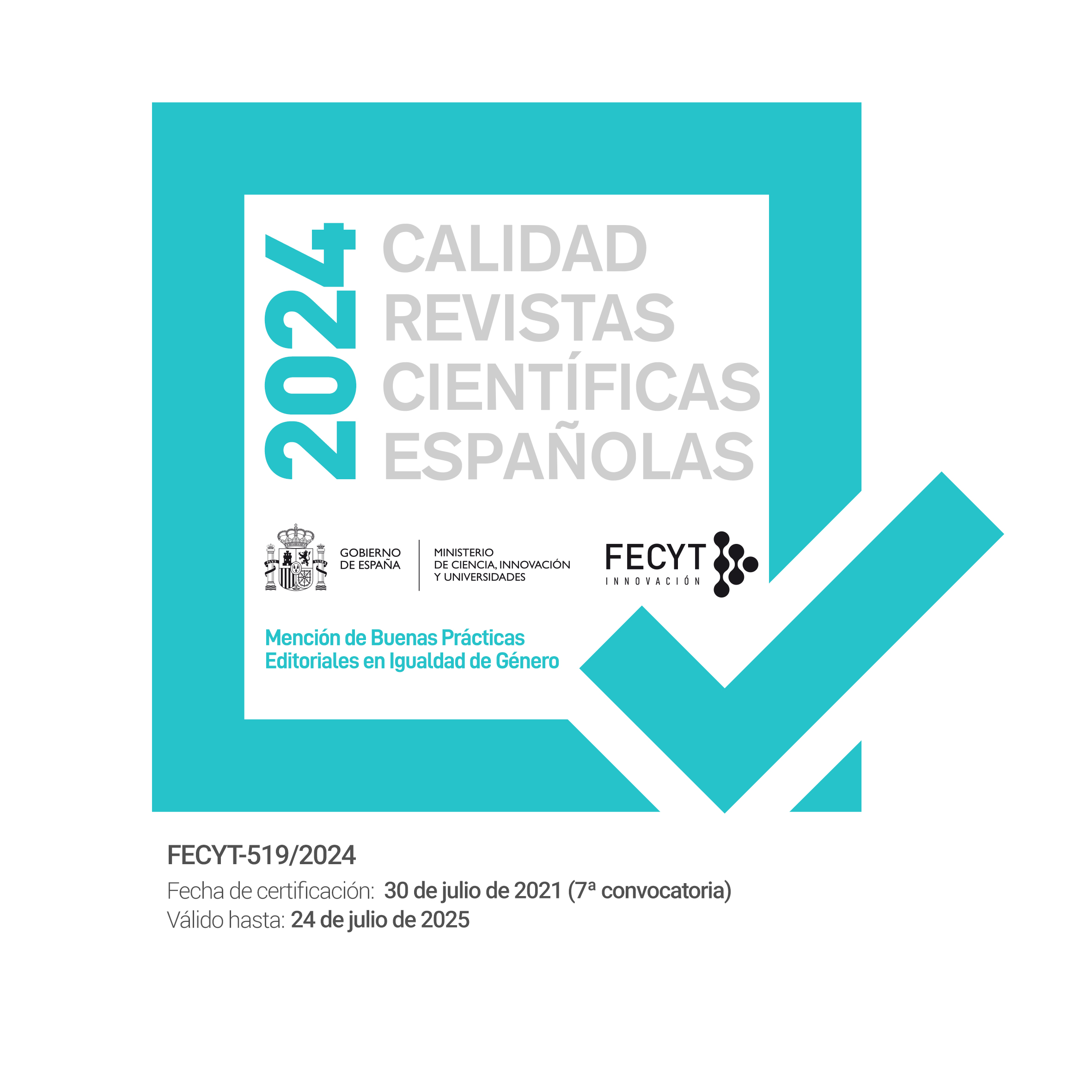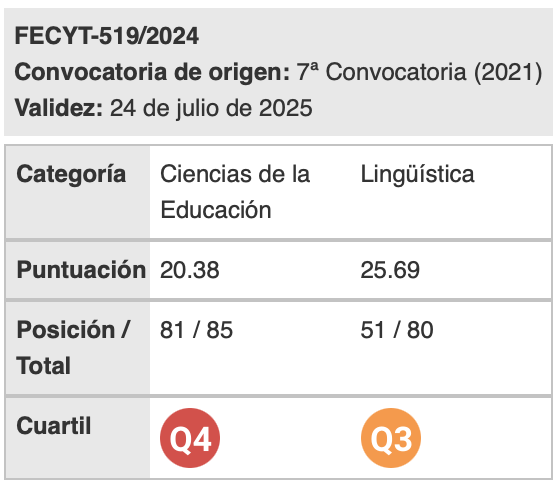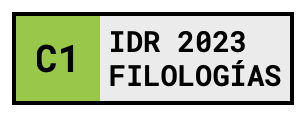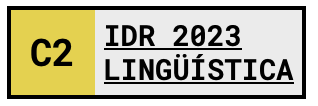L’enseignement-apprentissage du français juridique en contexte francophone
Approche contextuelle et interculturelle
Palabras clave:
francés jurídico (FOS), bijuridismo, interculturalidad, derecho islámico, derecho francésResumen
En este artículo damos cuenta de la incidencia del contexto jurídico y bilingüe en la enseñanza-aprendizaje del francés jurídico (FOS). Así, fenómenos como la diglosia, bilingüismo y bijuridismo repercuten en la configuración de un sistema jurídico. Para ello, se toma como ejemplo Marruecos como país del Magreb francófono cuyo sistema jurídico está caracterizado tanto por una dualidad jurídica (derecho islámico y derecho francés) como lingüística (árabe y francés). El análisis del corpus representativo revela que las asimetrías conceptuales entre dos sistemas jurídicos expresados en lengua francesa solo se pueden enseñar y aprender aplicando un enfoque contextual e intercultural.
Descargas
Citas
Amireault, V. (2012). La rencontre des langues et cultures en contexte d’enseignement /apprentissage du français langue étrangère dans le système universitaire chinois. Synergies: pays riverains de Mékong, 4, 51-63. < https://gerflint.fr/Base/Mekong4/amireault.pdf > [10/03/2020].
Azouzi, A. (2008). Le français au Maghreb: statut ambivalent d’une langue. Synergies Europe,3, 37-50
< http://www.abhatoo.net.ma/maalama> [06/03/2020].
Bellouch, L.(2014). L’islam: source d’inspiration du droit marocain. Jurimast, numéro spécial,15-31
< https://www.recil.grupolusofona.pt > [30/03/2020].
Ben Achour, I. (2007). Regard du Maghreb. Existe-t-il une culture juridique francophone? Conférence internationale des Facultés de droit ayant en commun l’usage du français (dir. Henry Roussillon). Toulouse: Presses de l’Université des sciences sociales de Toulouse,137-148.
Benzakour, F. (2012). Le français au Maroc.Une variété occultée en quête de légitimité. Ponts.Langues littératures civilisations des Pays francophones, nº12, 114-130. <https://www.ledonline.it/index.php/Ponts/article/viewFile/455/423 > [23/02/2020].
Letafati, R et Zarei, H. (2016). Langue et traduction spécialisée. Recherche en Langue et Littérature Françaises, Revue de la Faculté des Lettres,10 (18), 85-100. <https://www.pdfs.semanticscholar.org > [5/04/2020].
Toullelon, C. (2016). L’analyse des discours de l’archéologie collectés en contexte professionnel. Points commun- Recherche en didactique des langues sur objectif(s) spécifique(s): Analyse des données et élaboration des contenus de formation en FOS : des corpus aux ressources,3 (11), 5-24.<https://www.lefrançaisdesaffaires.fr> [09/04/2020].
Damette, E. (2007). Didactique du français juridique: Français langue étrangère à visée professionnelle. Paris: Harmattan.
Dechamps C. (2013). L’enseignement/apprentissage du français juridique: une proposition de démarche terminologique et didactique. Équivalences, 40 (1-2), 191-224. <https://doi.org/10.3406/equiv.2013.1387> [25/01/2020].
El Himer, M. (2000 b). Alternance codique dans le discours des locuteurs slaouis de souche. In Dumont, P. (éd.), La coexistence des langues dans l’espace francophone, approche macrosociolinguistique, S. l., AUPELF-UREF, pp. 253-260.
Faiz, R. (2006). Méthodologie d’aide à la structuration et à la formalisation des textes juridiques. Revue des Sciences de Gestion, Direction et Gestion 220(221), 61-71. <https://www.cairn.info/revue-des-sciences-de-gestion-2006-4-page-61.htm> [22/03/2020].
Gémar, J.C. (1998). Les enjeux de la traduction juridique: Principes et nuances. Équivalences (pp.1-19) < http://www.tradulex.com/Bern1998/Gemar.pdf > [15/03/2020].
Gémar, J.C. (1990). Les fondements du langage du droit comme langue de spécialité. Du sens et de la forme du texte juridique. Revue générale de droit., 4 (21), 717-738. < https://doi.org/10.7202/1058214ar > [30/03/2020]
Gémar, J. C. (1980). La langue juridique, langue de spécialité au Québec: éléments de méthodologie. The French Review, 6(53),880-893. <https://www.jstor.org/stable/391928?read-now=1&seq=2#page_scan_tab_contents> [18/03/2020].
Lacámara, Ruberte, P. (2001). Les textes de spécialité : traduction professionnelle et traduction pédagogique. In Isabel Uzcanga et al. (Coord.) Presencia et renovación de la lingüística francesa (pp.187-200). <https://gredos.usal.es/bitstream/handle/10366/131465/
-84-7800-963301870200.pdf?sequence=1&isAllowed=y> [11/07/2020].
Mabrour, A. (2007). L’alternance codique arabe/français: emplois et fonctions. In Constellations francophones (2), 12-20. < http://www.publifarum.farum.it/ > [10/02/2020].
Magnard, R. (1990). De l’organisation judiciaire au Maroc sous le Protectorat dela France. In Petite bibliothèque,26, (1-13).< htpp://www.2a31.net>pb_numerisees >pb_26_txt> [22/03/2020].
Murgue, B. (2011). La Moudawana: les dessous d’une réforme sans précédent. In Les cahiers de l’Orient,102(15-29). <https://www.cairn.info/revue-les-cahiers-de-l-orient-2011-2-page-15.htm > [30/03/2020]
Trescases, A. (2012). La traduction juridique :un art difficile dans les pays du Maghreb. In Bilinguisme juridique dans les pays du Maghreb, colloque international (pp.116-153). Algérie: Univesité d’Alger.
Terral, F. (2004). L’empreinte culturelle des termes juridique. Meta 4 (29),876-890. <https://www.erudit.org/en/journals/meta/2004-v49-n4-meta832/009787ar/> [02/03/2020]
Descargas
Publicado
Cómo citar
Número
Sección
Licencia
Aquellos autores/as que tengan publicaciones con esta revista, aceptan los términos siguientes:
- Los autores/as conservarán sus derechos de autor y garantizarán a la revista el derecho de primera publicación de su obra, el cuál estará simultáneamente sujeto a la Licencia de reconocimiento de Creative Commons que permite a terceros compartir la obra siempre que se indique su autor y su primera publicación esta revista.
- Los autores/as podrán adoptar otros acuerdos de licencia no exclusiva de distribución de la versión de la obra publicada (p. ej.: depositarla en un archivo telemático institucional o publicarla en un volumen monográfico) siempre que se indique la publicación inicial en esta revista.
- Se permite y recomienda a los autores/as difundir su obra a través de Internet (p. ej.: en archivos telemáticos institucionales o en su página web) antes y durante el proceso de envío, lo cual puede producir intercambios interesantes y aumentar las citas de la obra publicada. (Véase El efecto del acceso abierto).

Revista de Lenguas para fines específicos is licensed under a Creative Commons Reconocimiento-NoComercial-SinObraDerivada 4.0 Internacional License.























